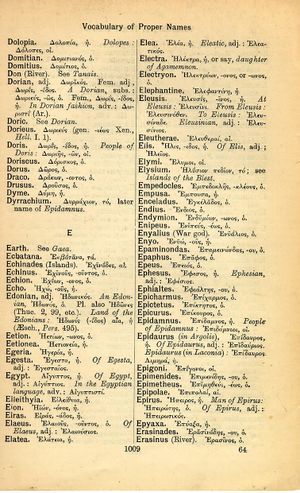Ephesus: Difference between revisions
(2) |
m (Text replacement - "(|thumb)\n(\|link=)" to "$1$2") |
||
| Line 1: | Line 1: | ||
{{WoodhouseENELnames | {{WoodhouseENELnames | ||
|Text=[[File:woodhouse_1009.jpg|thumb | |Text=[[File:woodhouse_1009.jpg|thumb|link={{filepath:woodhouse_1009.jpg}}]][[Ἔφεσος]], ἡ. | ||
|link={{filepath:woodhouse_1009.jpg}}]][[Ἔφεσος]], ἡ. | |||
<b class="b2">Ephesian</b>, adj.: Ἐφέσιος. | <b class="b2">Ephesian</b>, adj.: Ἐφέσιος. | ||
Revision as of 16:50, 18 May 2020
English > Greek (Woodhouse)
Ἔφεσος, ἡ.
Ephesian, adj.: Ἐφέσιος.
Latin > English (Lewis & Short)
Ĕphĕsus: i, f., = Ἔφεσος,
I an old and celebrated commercial city of Ionia, with a temple to Diana, now ruins near the village of Ayasaluk, Mel. 1, 17, 2; Plin. 5, 29, 31, § 131 sqq.; Plaut. Bacch. 2, 1, 2; 2, 3, 75; 102; 4, 9, 124 et saep.—Derivv.,
II Ĕphĕsĭus, a, um, adj., Ephesian: Diana, Plaut. Bacch. 2, 3, 73; id. Mil. 2, 5, 1; Cic. Div. 1, 23 fin.: mater, born at Ephesus, id. Phil. 3, 6, 15: pecunia, deposited in the temple there, Caes. B. C. 3, 33 fin.; 3, 105, 1. —Subst.: Ephesii, ōrum, m., the Ephesians, Plaut. Bacch. 2, 3, 75; Cic. Tusc. 5, 36, 105; Plin. 34, 8, 19, § 58 al.
Latin > French (Gaffiot 2016)
Ĕphĕsus,¹¹ ī, f. (Ἔφεσος), Éphèse [ville d’Ionie, célèbre par son temple de Diane] : Pl. Bacch. 171 ; Plin. 5, 131 || -sĭus, a, um, d’Éphèse : Cic. Div. 1, 47 || -sĭī, ōrum, m., Éphésiens, habitants d’Éphèse : Cic. Tusc. 5, 105.
Latin > German (Georges)
Ephesus (-os), ī, f. (Ἔφεσος), eine der zwölf Ionischen Städte in Kleinasien, berühmt durch den Dianentempel u. später durch Rhetorenschulen, j. Dorf Ayasaluk (d.i. Ἅγιος Θεόλογος, ein Beiname des Apostels Johannes), Plaut. Bacch. 171. Liv. 37, 45, 2 u. 19. Mela 1. § 88. Tac. dial. 15. – Dav. Ephesius, a, um (Εφέσιος), ephesisch, Cic. – Plur. subst., Ephesiī, ōrum, m., die Einw. von Ephesus, die Epheser, Plin.
Latin > English
Ephesus Ephesi N F :: Ephesus, city in Asia Minor (w/temple of Artemis/a 7 wonder)

